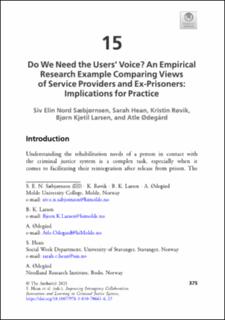Do we need the users voice : An empirical research example comparing views of service providers and ex-prisoners : Implications for practice
Sæbjørnsen, Siv Elin Nord; Hean, Sarah Catherine Patricia Duff; Røvik, Kristin; Larsen, Bjørn Kjetil; Ødegård, Atle
Chapter
Published version

View/
Date
2021Metadata
Show full item recordCollections
- Bokkapittel [44]
- Publikasjoner fra Cristin [429]
Original version
Sæbjørnsen, Siv Elin Nord; Hean, Sarah Catherine Patricia Duff; Røvik, Kristin; Larsen, Bjørn Kjetil; Ødegård, Atle: Do we need the users voice : An empirical research example comparing views of service providers and ex-prisoners : Implications for practice. In: Improving interagency collaboration, innovation and learning in criminal justice systems. Supporting offender rehabilitation / Hean, Sarah Catherine Patricia Duff; Johnsen, Berit; Kloetzer, Laure; Kajamaa, Anu (eds). pp. 375-399. Palgrave Macmillan 10.1007/978-3-030-70661-6_15Abstract
User involvement in service development is seen as important to the credibility of these interventions but involving prisoners or ex-prisoners in this process can be problematic because of the vulnerability of this group as well as security issues. Questions arise as whether front line workers can instead reflect the perspectives of their clients accurately during service development events. Further, we query whether an alignment of perspectives is important for effective professional-prisoner relationships and offender self-efficacy when engaging in rehabilitation and reintegration programmes. To explore these questions, this chapter, in a case study third sector mentorship organisation, compares and contrasts the views of ex-prisoners and their mentors. Q methodology is employed to make this comparison. We find that mentors perspectives are most in tune with the most pessimistic perspectives of their clients: the most lonely, indigent and ill group of the exoffenders they work with. They do not share the optimistic views that characterise other groups of offenders in receipt of their service. The chapter explores the implications of these different views for exoffenders, their mentors and the participation of the offender in service innovation.
